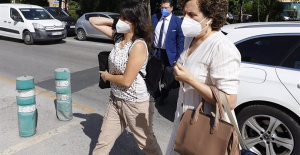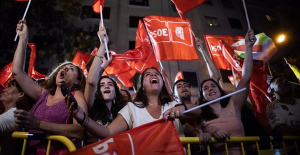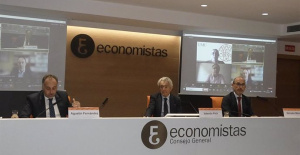The penalty is set at three years and one day in prison instead of the one imposed in the appealed sentence of four years and six months.
MURCIA, 16 Nov. (EUROPA PRESS) -
The Civil and Criminal Chamber of the Superior Court of Justice of the Region of Murcia (TSJMU) has dismissed the appeal against the ruling of the Provincial Court that sentenced a defendant for an attempted sexual assault on a woman in July 2020, in the Alameda garden, near the Malecón, next to the A-30 highway in Murcia.
Although the court confirms the sentence handed down by section 3 of the Provincial Court of Murcia last March, it modifies the sentence imposed, "by more favorable application than that provided for in the legal reform" operated by Organic Law 10/2022, of September 6, of comprehensive guarantee of sexual freedom, which is thus set at three years and one day in prison (instead of the one imposed in the appealed sentence of four years and six months).
According to sources from the TSJMU, the previous sentence of the Court declared it proven that "taking advantage of the fact that it is an area with little lighting and little traffic at that time, the defendant pushed the girl towards an adjoining orchard covered with weeds and totally in the dark, and threw her to the ground."
"Next, he held her hair and, in order to satisfy his sexual desire, he began to kiss her on the mouth and touch her breasts and genitals over her clothes," according to the facts declared proven by the sentence.
And that he did not complete the sexual act with penetration because at that moment "he was surprised by a couple of local police officers who, while on duty in the area, heard the screams (...) and went to the place where the two were, in girl's help."
The magistrates of the Civil and Criminal Chamber of the TSJ reject that there is a violation of the right to defense and the presumption of innocence, as alleged by the appellant, and emphasize that the evidence carried out undermines the presumption of innocence, since "the accused was discovered 'red-handed'" by two local police officers who, "alerted by the woman's screams, went to the scene until using a flashlight to discover how, among the grass and weeds, the defendant, with his pants lowered, he was holding the hair of the woman, who was crying and had her blouse unbuttoned and her pants pulled down a little".
Finally, in the third legal basis, the Civil and Criminal Chamber explains the principle of retroactivity of the most favorable penal norm to the accused included in article 2.2 of the Penal Code and, as it corresponds, in its capacity as appeal body, the adequacy of the penalty to that established after the reform operated by LO 10/2022 to the extent that is most beneficial for the accused, as had also been requested by the Public Prosecutor.
"In the present case, the penalty with which the crime typified in article 179 of the Penal Code is sanctioned has suffered a clear attenuation, going from a custodial sentence of 6 to 12 years to another of 4 to 12 years," The resolution details, which adds that the reduction in a degree corresponding to the attempted crime "thus determines a new custodial sentence of 2 years and 1 day to 4 years (and not the 3 years and 6 months to 6 years that would correspond according to to the old wording).
"Finally, the application of the aggravating circumstance of article 22.2 CP appreciated in the first instance sentence, mandatorily imposes the application of the aforementioned penalty in its upper half, which yields a penological balance with a minimum of 3 years and 1 day and a maximum of 4 years," the ruling notes.
Thus, the Chamber transfers to its decision the criteria of the sentencing court in the instance that imposed the minimum extension of the resulting sentence, which in the present case is 3 years and 1 day (instead of 4 years and 6 months of the previous regulation).
The resolution is not final and an appeal can be made against it before the Supreme Court.

 Exploring Cardano: Inner Workings and Advantages of this Cryptocurrency
Exploring Cardano: Inner Workings and Advantages of this Cryptocurrency Seville.- Economy.- Innova.- STSA inaugurates its new painting and sealing hangar in San Pablo, for 18 million
Seville.- Economy.- Innova.- STSA inaugurates its new painting and sealing hangar in San Pablo, for 18 million Innova.- More than 300 volunteers join the Andalucía Compromiso Digital network in one month to facilitate access to ICT
Innova.- More than 300 volunteers join the Andalucía Compromiso Digital network in one month to facilitate access to ICT Innova.-AMP.- Ayesa acquires 51% of Sadiel, which will create new technological engineering products and expand markets
Innova.-AMP.- Ayesa acquires 51% of Sadiel, which will create new technological engineering products and expand markets Juana Rivas's legal team manages to repeat the trial "that separated the brothers" in Italy
Juana Rivas's legal team manages to repeat the trial "that separated the brothers" in Italy The New York Justice annuls Harvey Weinstein's conviction for sexual crimes and orders a new trial
The New York Justice annuls Harvey Weinstein's conviction for sexual crimes and orders a new trial Socialist militants promote a large demonstration in support of Sánchez on Saturday in Ferraz
Socialist militants promote a large demonstration in support of Sánchez on Saturday in Ferraz Families with average income allocate a third of their income to paying taxes, according to economists
Families with average income allocate a third of their income to paying taxes, according to economists How Blockchain in being used to shape the future
How Blockchain in being used to shape the future Not just BTC and ETH: Here Are Some More Interesting Coins Worth Focusing on
Not just BTC and ETH: Here Are Some More Interesting Coins Worth Focusing on Retrópolis brings the golden age of video games and computing to the UPV
Retrópolis brings the golden age of video games and computing to the UPV Looking for video games that value the neighborhoods of Valencia
Looking for video games that value the neighborhoods of Valencia UPV researchers improve the efficiency of air conditioning systems using a geothermal heat pump
UPV researchers improve the efficiency of air conditioning systems using a geothermal heat pump València is committed to citiverse and smart tourism to be "the reference technological hub of the Mediterranean"
València is committed to citiverse and smart tourism to be "the reference technological hub of the Mediterranean" A million people demonstrate in France against Macron's pension reform
A million people demonstrate in France against Macron's pension reform Russia launches several missiles against "critical infrastructure" in the city of Zaporizhia
Russia launches several missiles against "critical infrastructure" in the city of Zaporizhia A "procession" remembers the dead of the Calabria shipwreck as bodies continue to wash up on the shore
A "procession" remembers the dead of the Calabria shipwreck as bodies continue to wash up on the shore Prison sentences handed down for three prominent Hong Kong pro-democracy activists
Prison sentences handed down for three prominent Hong Kong pro-democracy activists ETH continues to leave trading platforms, Ethereum balance on exchanges lowest in 3 years
ETH continues to leave trading platforms, Ethereum balance on exchanges lowest in 3 years Investors invest $450 million in Consensys, Ethereum incubator now valued at $7 billion
Investors invest $450 million in Consensys, Ethereum incubator now valued at $7 billion Alchemy Integrates Ethereum L2 Product Starknet to Enhance Web3 Scalability at a Price 100x Lower Than L1 Fees
Alchemy Integrates Ethereum L2 Product Starknet to Enhance Web3 Scalability at a Price 100x Lower Than L1 Fees Mining Report: Bitcoin's Electricity Consumption Declines by 25% in Q1 2022
Mining Report: Bitcoin's Electricity Consumption Declines by 25% in Q1 2022 Oil-to-Bitcoin Mining Firm Crusoe Energy Systems Raised $505 Million
Oil-to-Bitcoin Mining Firm Crusoe Energy Systems Raised $505 Million Microbt reveals the latest Bitcoin mining rigs -- Machines produce up to 126 TH/s with custom 5nm chip design
Microbt reveals the latest Bitcoin mining rigs -- Machines produce up to 126 TH/s with custom 5nm chip design Bitcoin's Mining Difficulty Hits a Lifetime High, With More Than 90% of BTC Supply Issued
Bitcoin's Mining Difficulty Hits a Lifetime High, With More Than 90% of BTC Supply Issued The Biggest Movers are Near, EOS, and RUNE during Friday's Selloff
The Biggest Movers are Near, EOS, and RUNE during Friday's Selloff Global Markets Spooked by a Hawkish Fed and Covid, Stocks and Crypto Gain After Musk Buys Twitter
Global Markets Spooked by a Hawkish Fed and Covid, Stocks and Crypto Gain After Musk Buys Twitter Bitso to offset carbon emissions from the Trading Platform's ERC20, ETH, and BTC Transactions
Bitso to offset carbon emissions from the Trading Platform's ERC20, ETH, and BTC Transactions Draftkings Announces 2022 College Hoops NFT Selection for March Madness
Draftkings Announces 2022 College Hoops NFT Selection for March Madness



























